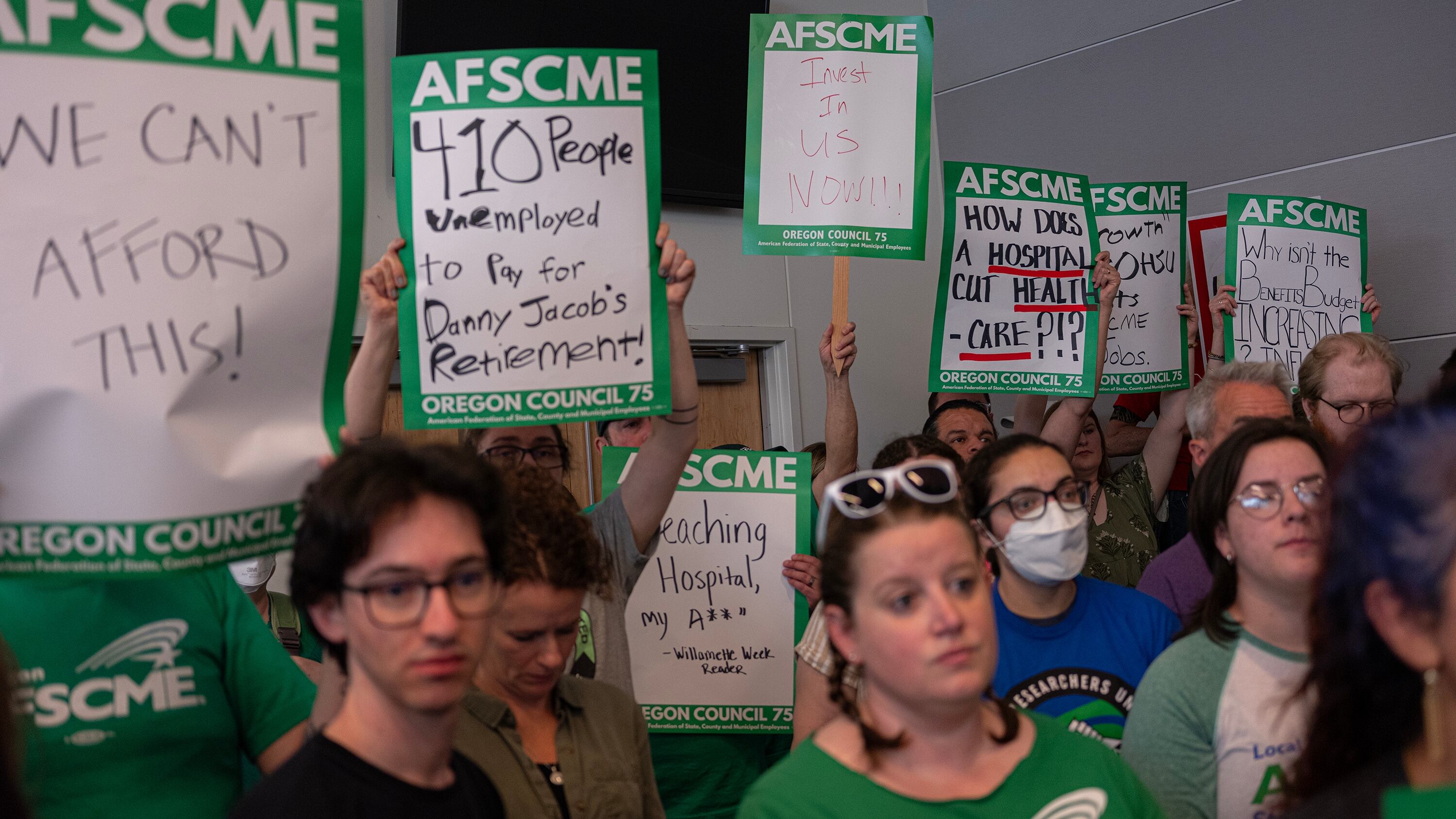Researchers with doctoral degrees took another step toward going on strike this week, giving leaders at Oregon Health & Science University 10 days’ notice that they will walk out unless last-ditch negotiations yield wage increases they’ve been seeking since September.
The notification, sent Monday, came after OHSU offered raises that came too little, too late, according to the 260-member Postdoc Workers United, a new unit of the American Federation of State, County and Municipal Employees. The increase was the first one OHSU offered in 11 months of talks.
OSHU told the union it would raise wages by 3.5% upon ratification of a contract, then boost them by the same amount each August until the starting wage hits $70,000, the union said. The union is asking for an immediate 5.5% increase, followed by another 5.5% in March.
The starting salary for postdoc researchers at OHSU is $61,008 per year, an amount set by the National Institutes of Health that is expected to rise to $70,000 over the next few years because of inflation. The union wants OHSU to follow the University of Washington and the University of California, which pay more than the minimum in high-cost cities like Seattle and San Francisco.
“They should have given us this wage proposals months ago,” said AFSCME spokesman David Kreisman. “They look at these highly educated workers as a cheap set of hands.”
OHSU and the union are scheduled to hold mediation sessions Aug. 13 and 14. If those talks end without an agreement, the union intends to strike Aug. 15, Kreisman said.
Negotiations have bogged down in part because OHSU faces a budget deficit because salaries and costs for supplies are rising faster than revenue from patient care. The university is also trying to improve its finances as it prepares to merge with Legacy Health, another struggling hospital system.
Most of OHSU’s research is funded by grants used to pay both postdoc salaries and cover overhead costs at the university.
“OHSU’s proposal is wholly insufficient and we continue to be fully prepared to go on strike on Thursday, Aug. 15, if we don’t see any movement toward a living wage,” Dr. Paige Arneson-Wissink, Ph.D., a pancreatic cancer expert, said in a statement. “Our living wage proposal is a drop in the bucket compared to the $600 million we brought in via research grants last year.”
The postdoc union is one of three AFSCME unions that represent researchers at OHSU. Two others mostly represent researchers who don’t have doctoral degrees. Postdoc Workers United formed last year. If it wins a contract in these negotiations, it would be its first as a union.
OHSU said it received notice of the strike and is willing to continue negotiations.
“While OHSU is disappointed in this declaration, we respect the rights of employees to engage in protected union activity, such as choosing to or choosing not to strike,” spokeswoman Sara Hottman said in an email. “OHSU continues to be hopeful that a strike can be avoided, and remains committed to establishing a fair contract in recognition of all postdocs’ hard work supporting the research mission.”
PORTLAND, OR - After nearly a year at the bargaining table and seeing zero progress toward a fair wage, the roughly 250 postdoctoral researchers provided OHSU with the necessary 10 day-notice on Monday, August 5th - that unless OHSU comes forward with a realistic wage proposal, postdocs will go on strike on Thursday, August 15th.
Last week, OHSU postdocs voted overwhelmingly to authorize a strike, with nearly 90% voting in favor of a strike.
Typically, employers engage on wage proposals as they are presented. Still, it took OHSU nearly a year, an overwhelming strike vote, a strike announcement, and a 12-hour bargaining session for OHSU to produce their first real wage proposal.
“OHSU’s proposal is wholly insufficient and we continue to be fully prepared to go on strike on Thursday, August 15th if we don’t see any movement toward a living wage” said Dr. Paige Arneson-Wissink, PhD, a Postdoctoral Researcher in the study of pancreatic cancer.
“Our living wage proposal is a drop in the bucket compared to the $600 million we brought in via research grants last year. To think someone living in Portland and someone in Toledo, Ohio require the same wage to afford room and board is absurd, but that’s what OHSU is saying” continued Dr. Arneson-Wissink.
Salary disparities at OHSU are extreme, with some executives earning in two weeks what the postdocs receive annually. OHSU has so far refused to make a reasonable salary offer above the inadequate minimum wage of $61,008 established by the National Institutes of Health. This minimum does not meet the cost of living in Oregon or industry standards. The University of Washington pays a minimum salary that is $10,000 higher than the minimum offered to OHSU researchers.
“The nearly 40,000 workers represented by Oregon AFSCME stand in solidarity with OHSU’s postdocs and their fight for fairness,” said Oregon AFSCME Executive Director Joe Baessler.
“After being diagnosed with stage four lymphoma last year, I was lucky to be able to receive treatment at OHSU. I’m alive today because of the research postdoctoral workers at OHSU do every day. Thanks to the work of these researchers, I know there are countless stories similar to mine” continued Baessler.

